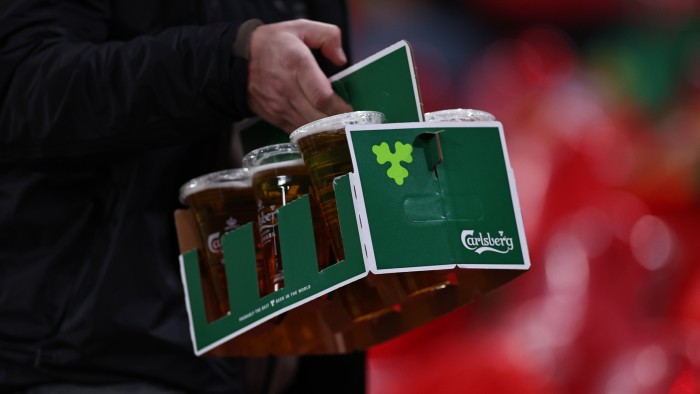Unlock the Editor’s Digest for free
Roula Khalaf, Editor of the FT, selects her favourite stories in this weekly newsletter.
Carlsberg’s chief executive has warned that the impact of US tariffs on already weak consumer spending means there will be “no winners”, even though the Danish brewer is “insulated” from the direct fallout of the levies.
Carlsberg’s chief executive Jacob Aarup-Andersen told the Financial Times that the brewer was largely protected because it sells only a small amount of beer to US consumers. However, he cautioned: “We look at it with the same concern as everyone else because this [risks] creating a slowdown in the global economy . . . that could impact consumer spending.”
European businesses with less direct exposure to President Donald Trump’s tariffs on US imports are bracing themselves for aftershocks, including the potential dent to already fragile consumer confidence, inflationary pressures and the impact of diverted exports on demand and raw material costs.
“There are no winners . . . but from a Carlsberg perspective, this [will not have] a material impact,” Aarup-Andersen said. The US accounts for less than 0.1 per cent of Carlsberg’s total volumes, with the bulk of its business in Europe and Asia.

Trump has paused the “reciprocal tariffs” on most countries announced earlier this month, but has hit China with steep levies, and stuck with a 10 per cent tariff on most goods from other countries.
Aarup-Andersen said consumers had been subdued “for the better half of more than two years now” and that this was unlikely to change given the geopolitical uncertainty, heaping pressure on the company as it tries to build back sales volumes.
Like the rest of the consumer goods sector, Carlsberg raised prices to pass on higher commodity costs to consumers during a period of runaway inflation. However, customers have started to balk at rising costs, hitting the company’s sales volumes.
Barclays analysts said China’s retaliatory tariffs on US goods could also hit Carlsberg harder than rivals, given its 18 per cent sales exposure to China. In a recent note, they wrote that elevated levies on US goods could “stretch [Chinese consumers’] pockets and likely lead to downtrading”.
Carlsberg is expected to report a drop in group organic sales volumes of 0.4 per cent and revenue growth of 0.5 per cent at its first-quarter trading update next month. In 2024, it reported revenue growth of 1.9 per cent to DKr75bn ($11bn).
The Danish executive, who took the helm at Carlsberg in 2023, said the “big unknown” for the brewing industry was what would happen to the cost of the raw materials involved in beer production, including aluminium, glass and barley.
The US this month slapped 25 per cent tariffs on all imported canned beer, in addition to its steel and aluminium product tariffs, causing consternation among European and Mexican brewers with large US export markets.
Aarup-Andersen said the impact of new levies on commodity prices remained unclear. “It really depends on what tariffs end where, and that’s the analysis that all of us are doing at the moment,” he said.
The company is also looking out for the impact of additional raw material supply entering Europe that would otherwise have been destined for the US. Oversupply in Europe would “on paper” lead to lower prices, “but I think it’s too early to call it”, said Aarup-Andersen.
The trade shifts come as Carlsberg pivots its portfolio towards faster-growing soft drinks, non-alcoholic and low-alcohol beers, and pricier beer brands such as Grimbergen and Brooklyn Lager, as consumers around the world cut back on drinking and traditional beer sales flag.
“I’m not running a business that absolutely has to sell alcohol to you. We want to make sure we sell the product that you desire at that given moment,” said Aarup-Andersen.
Half of Carlsberg’s sales are now made up of low and no-alcohol products since the brewer completed its £3.3bn acquisition of UK soft drinks group Britvic in January.
Aarup-Andersen said he had made the acquisition to scale up Carlsberg’s UK business, but also to pivot to faster-selling categories. Britvic’s brands include products such as 7Up, J20 and energy drink Rockstar.
“Britvic are exposed to higher-growth categories than the traditional beer category,” he added. “And we’re strategically pivoting our business towards higher-growing categories, maintaining a strong core around our brewing business.”


